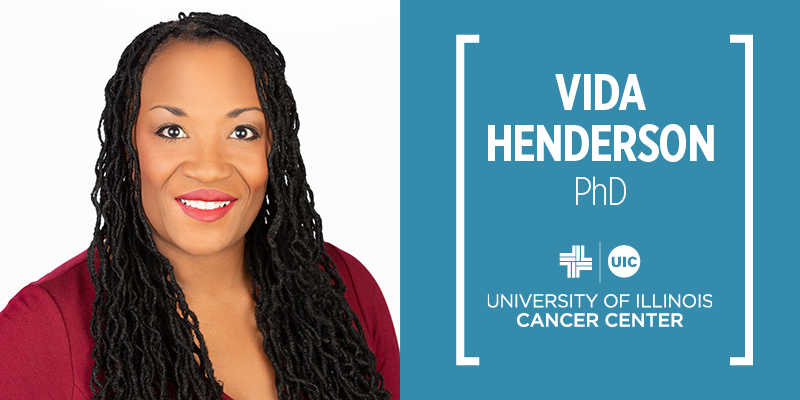
The large disparity gap between Black and white women undergoing breast cancer screening can be reduced through better education, support and care coordination provided by patient navigators, according to new research conducted at the University of Illinois Cancer Center.
Patient navigators – individuals who help guide a patient through the healthcare system, including screening, diagnosis, treatment and follow-up – are a critical component of an integrated healthcare team approach where they can expand patient-centered care when resources may be limited, especially for institutions that predominantly care for uninsured, low-income or minority populations, said Vida Henderson, PhD, PharmD, MPH, MFA, director of the UI Cancer Center’s Community Engagement and Health Equity office.
Although detection and treatment for breast cancer in the U.S. have improved, disparities between Black and white women in mortality rates persist, said Henderson, whose latest research has been published in the journal Cancer. Currently, death rates are 39% higher for Black women compared to white, she said.
“Black and Latina women have a higher likelihood of advanced stage cancer diagnosis due to health care system factors such as decreased access to quality breast care, lower likelihood of standard treatment, lack of insurance, and lack of effective breast cancer education. Additionally, individual level factors such as socioeconomic status, cultural beliefs, environmental factors, and genetic factors also contribute to risks for breast cancer,” Henderson said.
Chicago has the seventh highest racial disparity in breast cancer mortality rate in the U.S. – 40%. Death rates for Black women are 1.5 times higher compared to white women, and Black and Latina women are more likely to experience diagnostic and treatment delays, undergo ineffective screening mammography and are less likely to receive care at Breast Imaging Centers of Excellence (BICOE) accredited facilities in Chicago, she said.
The lack of access to coordinated care among under-resourced populations, such as those who receive care at Federally Qualified Health Centers (FQHCs), also contribute to existing breast cancer disparities. FQHCs are community-based health care providers that receive monies from the federally-funded Health Resources and Services Administration (HRSA) Health Center Program to provide high-quality, culturally competent primary care services in underserved areas.
Mile Square Health Center, a FQHC that has 12 locations throughout Chicago, cares for nearly 40,000 people annually, whether or not they can pay for it. Started in 1967, it has been affiliated with UI Health since 1990. A breast cancer screening program, entitled Mi-MAMO (Mile Square Accessible Mammogram Outreach and Engagement) was initiated by the UI Cancer Center in 2017 at Mile Square for communities that have a disproportionate burden of cancer mortality, are racial/ethnic minorities, and experience high rates of poverty and are lacking health insurance.
Conducting programs such as Walk-in Wednesdays, where women can receive a mammogram without an appointment at Mile Square’s Near West clinic, and other community outreach events, education and in-clinic navigation, more than 700 age-eligible and risk-eligible women received screening mammograms between August 2017 to December 2018. Currently, more than 2,000 patients have received patient navigation and screening services through the program.
Additionally to date, 105 women were discovered to have abnormal breast symptoms (breast pain, lump, or discharge) and were automatically referred for a clinical breast examination and diagnostic mammogram. More than 57% of the women were uninsured, with more than 54% being Latina and 39.5% Black. Of all the navigated women screened, more than 39% were referred for a diagnostic service. Seventy-one biopsies were conducted, and 26 cancers were diagnosed, Henderson said.
While mammography rates have increased over the past 30 years, they remain lower among groups that are uninsured, low-income, and less educated, Henderson said. Strong evidence suggests that patient navigation improves cancer screening, reducing delays in breast care, providing psychosocial support and care coordination, and helping patients overcome barriers to accessing care.
“Patient navigation programs, especially those serving high-risk populations, have the potential to mitigate existing disparities in breast cancer outcomes for underserved women and helps to ensure that national gains experienced by some are afforded to all,” Henderson said.
Co-authors on the paper included Erica Martinez, MPH, MBA; Barbara Williams, MPH; Paola Torres, MPHc; Nasima Mannan, MPH; and Karriem Watson, DHSc, MS, MPH, all of the UI Cancer Center; Lauren Green, MD, UI Health; Katherine Tossas-Milligan, PhD, MS, and Robert Winn, MD, Massey Cancer Center at Virginia Commonwealth University, Richmond, Va.; and Beti Thompson, PhD, Fred Hutchinson Cancer Research Center, Seattle. The research was funded by the Chicago Department of Public Health, grant number 57469-450513.
